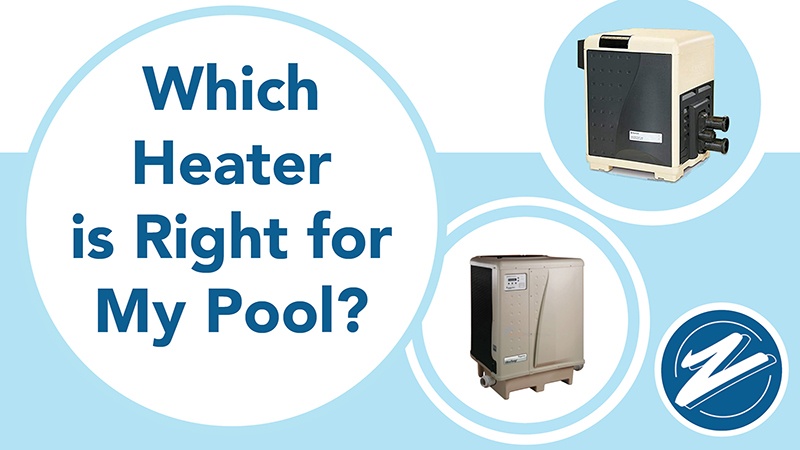
Today we’re going to talk about the pros and cons of the three main types of pool heaters — gas heater, heat pump, and solar heater.
Gas Pool Heaters
Here at Zagers, we recommend Pentair Mastertemp Heaters, because they’re extremely easy to install and use. You just attach the gas line to one side, attach the in/out water lines, and plug the heater into a 110 V outlet. Once everything is connected, it’s as simple as turning the temperature up and down, and setting it where you want it. That’s actually one of the other pros about a gas heater — it will work whenever you want it to. If you want your pool 86°F in the middle of October, a gas heater can do that.
One of the downsides to a gas pool heater is that you have to bring the gas line to it from the meter, which can be a little expensive, depending on how far away your meter is. The second negative of a gas heater is you have the additional expense of fuel. To regulate the temperature but keep utility costs down, a lot of people will turn their gas pool heater on, warm up the pool, then turn it off and let it cool down, and then just keep turning the heater on and off as needed.
Pentair Mastertemp Heaters come in three sizes: 125,000 BTU, 200,000 BTU, and 250,000 BTU. The size you need depends on the size of your pool. Contact us and we’ll recommend the right size for you.
Here’s a quick summary and installation tips.
Gas Pool Heater Pros
- Heats a pool up fast
- Lower upfront costs
- Works in any temperature
- Easily installed into a plumbed gas line
Gas Pool Heater Cons
- Utility cost (gas)
- Requires maintenance
- May not last as long as other options
Gas Pool Heater Installation Tips
- Do not install a gas pool heater under a deck.
- You must vent the heater if it’s being installed in a pool house.
- Install the heater within 15’ of equipment for optimal heating.
Heat Pumps
Heat pumps are very different from gas heaters. A heat pump essentially works like an air conditioner in reverse. It takes the heat out of the air from the back of the coils and puts the heat into the water. One positive for a heat pump is that it’s very efficient, making it a lot less expensive than running a gas heater.
Similar to a gas heater, they have water in/out hookups and an electronic thermostat. What we typically recommend for a heat pump is that you set it and forget it, meaning you turn it up to whatever you like and just leave it there. Note that a heat pump will take a little longer than a gas heater to get your pool up to your desired temperature, because it’s using the heat from the air vs. a direct fire, but it’ll heat better and for less money.
A heat pump costs a little bit more money to buy, but it runs on 220 V, so if you already have a 220 V outlet for your inground pool, it’s super easy to hookup. If you have an above ground pool, you already have conduit, so you can usually just run another wire. Either way, you don’t have the added expense of running a gas line. The lower cost of installation typically offsets the higher purchase price of the unit, making heat pumps come in about the same as gas heaters for initial purchase and install. That being said, heat pumps will save you money in the long run, and can keep your pool warm all the time.
Let’s take a quick look at the pros and cons of pool heat pumps:
Pool Heat Pump Pros
- Lower cost to run
- Energy efficient
- Easy to install
- Set it and forget it
Pool Heat Pump Cons
- Higher upfront cost
- Slower to heat
- Ineffective when outdoor temp is below 50°F
Solar Heaters
Solar heaters work just like they sound. They convert sunlight to heat, which is free energy as long as the sun is out. Along with installing a solar heater, you’ll also need to install a bypass kit. When the sun is out, you turn the bypass on, allowing the water to flow through the solar heater and warm up. When the sun isn’t out, you want to turn the bypass off, because the temperature of your pool will drop faster running through the bypass if it’s left on but cooling off.
How many solar heaters you need depends on the size of your pool. For a 24’ round, flat-bottom pool, we recommend two solar heaters. Contact us and we can give you a specific recommendation for your pool.
Note that solar heaters should not be confused with solar covers. Solar covers mainly retain the heat already in the pool water, but can increase the water temperature a few degrees over several hours and reduce evaporation. They won’t warm up a pool nearly as effectively as a solar heater.
Pool Solar Heater Pros
- No utility cost
- Eco-friendly
- Low maintenance
- Long lifespan
Pool Solar Heater Cons
- Only heats the pool when the sun is out
- Cannot adjust/control the temperature
- Slow to heat the pool
Interested in a Pool Heater?
Whether you’re ready to invest in a pool heater or still aren’t sure which type of pool heater is right for you, we’re here to help. Contact us with your interest or questions, and we’ll get you what you need to warm up your pool in no time.